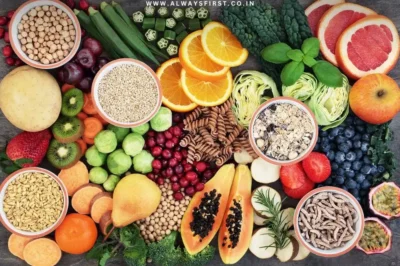Key Takeaways:
✔ 95% of people are fiber-deficient, leading to poor digestion, cravings, and sluggish metabolism.
✔ Fiber feeds gut bacteria, boosting immunity, mood, and even stress resilience.
✔ Not all fiber is the same—soluble and insoluble types play unique roles in health.
Most People Are Fiber-Deficient—And Don’t Even Realize It
A staggering 95% of Americans fail to meet daily fiber needs, says Dr. Saurabh Sethi, a Harvard and Stanford-trained gastroenterologist. But this isn’t just a Western problem. Dr. Adithya V Naragund, a senior GI surgeon at Cytecare Hospitals, Bengaluru, confirms that urban Indians face similar deficiencies due to processed diets.
“Low fiber intake leads to slow digestion, sugar cravings, and constant hunger,” he explains. Many dismiss these signs as stress or poor sleep, but they’re often the gut’s cry for more fiber.
Fiber Doesn’t Just Help Digestion—It Feeds Your ‘Second Brain’
“You’re eating for trillions of gut microbes,” says Dr. Sethi. Dr. Naragund agrees: Fiber acts as fuel for beneficial gut bacteria, which influence everything from immunity to mental health.
“A healthy microbiome regulates mood, fights inflammation, and even impacts stress response,” he adds. Think of fiber as essential maintenance for your body’s internal ecosystem.
Soluble vs. Insoluble Fiber: Why You Need Both
Not all fiber works the same way. Dr. Sethi breaks it down:
- Soluble fiber (oats, apples, beans) lowers cholesterol and stabilizes blood sugar.
- Insoluble fiber (whole grains, veggie skins) adds bulk to stool, preventing constipation.
“Combining both types keeps your gut balanced,” says Dr. Naragund. Traditional Indian foods like sabut dal, bajra, and jowar are excellent sources—if they’re not overly refined.
Fiber Fights Belly Fat—Without Strict Dieting
High-fiber foods keep you fuller longer, reduce sugar spikes, and curb cravings, says Dr. Sethi. Dr. Naragund highlights studies showing 25–30g of daily fiber improves metabolism and targets visceral fat.
“Unlike fad diets, fiber promotes sustainable weight loss by improving insulin sensitivity,” he notes.
Caution: Don’t Overdo Fiber Too Fast
While fiber is essential, ramping up too quickly causes bloating and gas. Dr. Naragund advises a gradual increase with plenty of water and movement to ease digestion.
Fiber Isn’t Just in Salads—Explore These Unexpected Sources
Forget forcing down bland greens. Lentils, chia seeds, berries, and even popcorn pack fiber, says Dr. Sethi. Dr. Naragund recommends flaxseeds, fruits with skin, and minimally processed grains for easy daily intake.
The Overlooked Long-Term Benefits of Fiber
Beyond digestion, fiber lowers heart disease risk, sharpens brain function, and builds a resilient microbiome, explains Dr. Sethi.
“It’s a cornerstone of preventive health,” stresses Dr. Naragund. “From hormones to heart health, fiber’s impact is far bigger than most people realize.”






































Leave a Reply